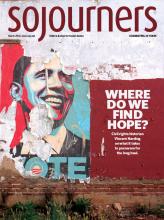Robi Damelin has always fought injustice. Growing up in South Africa, she spoke out against apartheid and worked actively for co-existence. In 1967, she moved to Israel—“to solve the conflict,” she says with self-deprecating humor. She ended up working on a kibbutz. “Ever since then,” she told me, “I have had a love-hate relationship with this country.” She loves the reality of a homeland for the Jewish people, but she hates the oppression of Palestinian people that results from the Israeli military occupation. “Israel will never be free until the Palestinians are free,” she says.
Robi’s son, David, shared her perspective about the occupation. Robi claims he “would rather have gone to jail than serve in the military, but he knew that as soon as he was released, he’d just be posted somewhere else. In the end we agreed it would be better for him to serve as an officer and set an example to other soldiers by behaving like a human being.” David fulfilled his required service, but in 2002 he was called up to the reserves. Again, he and Robi decided he should serve and set an example.
But as a soldier “he was a symbol of an occupying army.” On March 3, 2002, 28-year-old David Damelin was killed by a Palestinian sniper.
“I was beside myself with grief,” says Robi. “I had all the good things in life, but it all became totally irrelevant. I just wanted to prevent other families from experiencing this.” Robi was invited to a meeting where she met Palestinian mothers who had also lost children. “I saw there was no difference in our pain. I realized that through our joint pain we could speak out and make a difference.”
Read the Full Article
